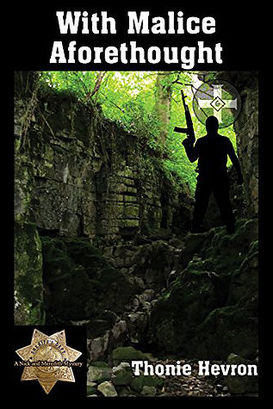
Welcome to our Wednesday book chat!
Two weeks in a row we have guest bloggers! This Wednesday mystery author and former dispatcher Thonie Hevron is discussing how authors can "get it right" while writing about police procedures. And readers can judge whether their favorite author knows the real world of cops. With that brief intro, the blog is yours, Thonie.
8 Tips for More Authentic Cop Characters
By Thonie Hevron
Being a member of several “law enforcement only” listservs and Facebook pages, I put the question to the troops. Boy, did they have opinions! For this post, I chose one sergeant’s answer. He took time to consider his answers and I’m pleased to present them. My comments are in italics.

• First, sit down with and listen to competent, career cops from the geographic area your story takes place in. What happens daily in downtown LA is different from Modesto which is a world of difference from a rural deputy in Colorado, urban Miami, or New England.
• Stop making lieutenants and captains – in most agencies – the active, best cops and lead investigators. It is officers, deputies, detectives and maybe the odd sergeant who are out there working cases, hooking bad guys. Lieutenants and captains (never mind chiefs and sheriffs) in many places have to check their desk drawers for the handcuffs.
• Unlike Blue Bloods and other shows, detectives do not lead the SWAT team into locations. Nor does SWAT conduct their own investigations.
• Evidence issues, crime scene lab stuff “… oh please”, he said. I could do a whole book on the mistakes and misrepresentations of evidence procedures. DNA coming back immediately was top of the list for many. DNA results are not instantaneous. See website--Connecticut Office of Legislative Research 2010 study. Granted, this is an older survey, but it gets the point across about all crime labs. State and local laboratory turnaround times for various forensic tests in the 50 states: In some states, agencies must wait for two years for results. NCIS? Two minutes-not even close.
• Patrol procedures, use of force, tactics: find the field training officers, instructors, etc. buy them coffee and ask questions. I’ve had an author come take classes to get an actual education on this subject. It showed in her writing.
He went on to say: “The profession has a significant perception problem partly as a result of many people believing what they see the entertainment media present as gospel when it is not. The public then evaluates what we actually deal with and opine based on their knowledge of the profession from TV and movies. That hurts the profession and it badly hurts individuals (police, victims, involved parties) when done that way.”
--Eric, Sergeant, Masters in Public Administration
1. Most agencies have a Public Information Officer (PIO) who is accessible to the public. Contact him or her and ask your questions.
2. Talk to a friend of a friend, your cousin, or whoever—everyone knows somebody who’s a cop. See if they would be willing to talk to you. You’d be surprised how many cops would cooperate with a writer.
3. Don’t be afraid to contact a cop (as long as he’s not on a traffic stop or some other enforcement activity) and ask your question. Coffee breaks are sacred to most patrol personnel. If you can, avoid taking up their R&R time; catch them afterward.
4. Go to the police station. Tell them why you’re there and ask who the best person would be to talk to. Although not overtly trusting at first, most cops know the advantages of having an accurate media portrayal as opposed to the Hondo Harrellson of “SWAT” and Martin Riggs “Lethal Weapon” tropes.
5. A citizens’ academy is a great place to get a feel for law enforcement and make contacts for consulting.
6. Often, as Eric says, writers assume they know the procedure for a task but can have it all wrong. I highly recommend having someone with a law enforcement background read your manuscript before you submit it. Have him/her read for technical terms, wording, cultural aspects and so on.
7. There are many blogs with explorations into the authentic cop world. Besides mine (Just the Facts, Ma’am), my favorite is The Graveyard Shift by Lee Lofland. Lee literally wrote the book on police procedure for writers. Annually, he puts on the Writer’s Police Academy in the Midwest. I’ve heard it’s a fabulous weekend with hands-on experiences: shooting, driving police cars, forensics and much more.
8. Join the Public Safety Writers Association. Really. This is a group of retired and active duty first responders. The members cover FBI agents, (including a profiler and a microbiologist involved in the Anthrax Investigation after 9/11), police and fire both (retired and active duty), line employees (patrol) and administrators, emergency medical personnel, dispatchers (me!) from all across this continent. We have several Canadian members who actively participate in the club. Every one of these people are extremely helpful to authors. The rolls include writers with no police experience and all are welcomed equally. It’s a great club and fun group.
There’s no excuse for shoddy writing. The internet has made the world smaller and as long as you look in the right places, you can find pointers to your answers.

Bio:
Thonie Hevron, a retired 911 dispatcher, resides in Northern California. Her work has appeared in Beyond Borders: 2014 Redwood Writers Anthology and Felons, Flames and Ambulance Rides: Public Safety Writers 2013 Anthology. She is the author of three mystery novels, By Force or Fear, Intent to Hold and With Malice Aforethought, currently available on Amazon but will be re-published by Aakenbaaken & Kent in 2018. Her fourth mystery/thriller, Felon with a Firearm is forthcoming in late 2018.
Author Contacts:
Website: Thonie Hevron
blog: Just the Facts, Ma'am
twitter: @ThonieHevron

WITH MALICE AFORETHOUGHT
Genre: mystery/thriller
Blurb:
Sheriff’s Violent Crimes Detectives investigating a murder stumble into an army of white nationalist extremists in the remote Sonoma County hills. Fighting to survive against the militia and the hostile environment, they uncover a plot to release a dangerous pathogen into the local water supply and devastate the local law enforcement agencies.
Buy Link: With Malice Aforethought
 RSS Feed
RSS Feed





